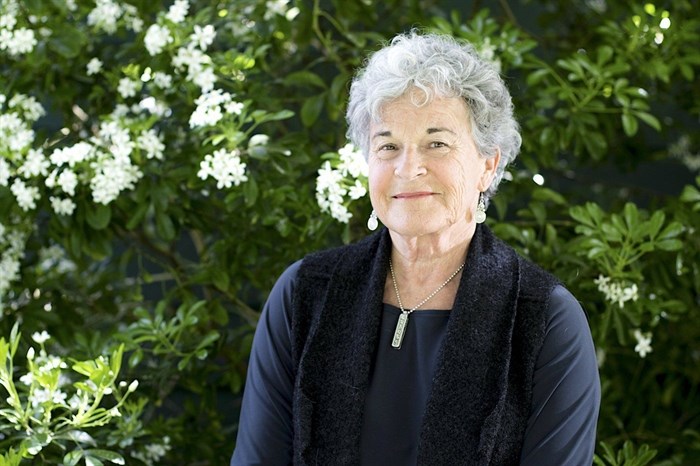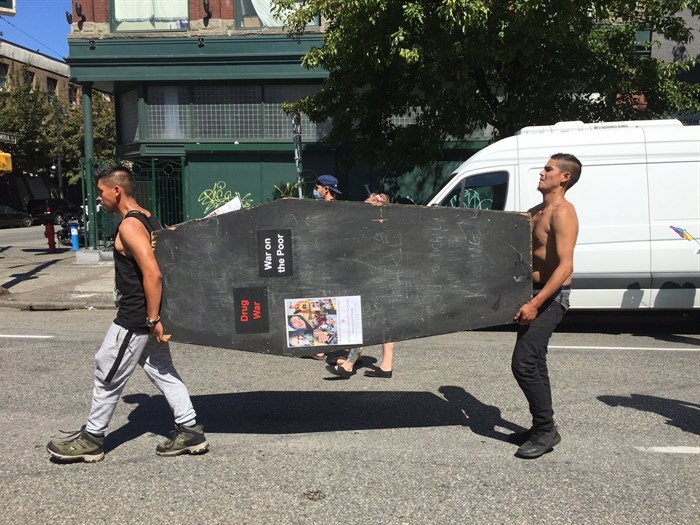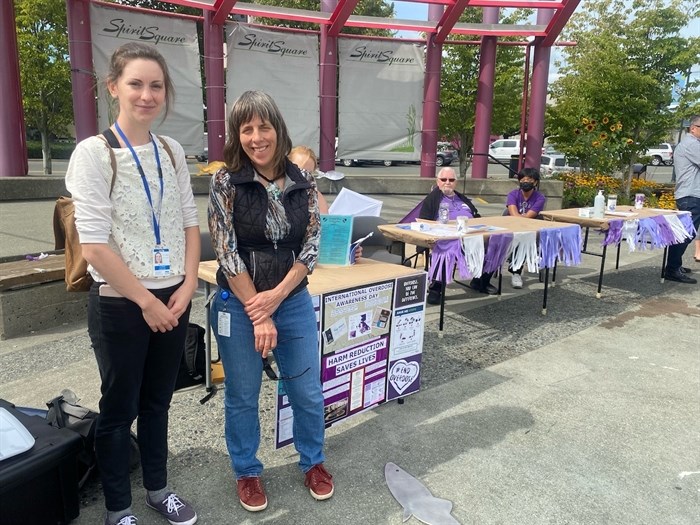
Addiction is the only health issue where society shuffles people to the black-market to buy toxic drugs, says Leslie McBain of national advocacy group Moms Stop The Harm.
Image Credit: SUBMITTED/Leslie McBain
September 01, 2021 - 7:00 PM
It’s mind-boggling communities across Canada must still organize for an annual awareness day to draw public and policymakers’ attention to poisoned street drugs and an ongoing health crisis that has killed more than 21,000 people in just five years, advocates say.
Events for International Overdose Awareness Day are taking place across Canada on Tuesday to commemorate people killed by toxic street drugs, recognize the grief of family and friends, and advocate for change.
Yet as people gather to mourn across the globe, and despite public recognition of the public health crisis, the death toll across Canada from toxic street drugs is the highest it has ever been — and is spiking, said Karen Ward, a drug policy consultant for the City of Vancouver.
“It’s outrageous and so upsetting that we even have to have awareness when what we need right now is outrage and immediate and obvious action to change drug policy,” said Ward.
“Especially when we know what the problem is, and we know what to do.”
Deaths from poisoned street drugs continue to soar, and are anticipated to get worse, Ward said, noting recent federal modelling suggests that if the status quo continues, more than 1,800 people in Canada will die every three months in 2021 from the illicit toxic drug supply.

Advocates are calling on the government to change drug policy and implement safe supply after thousands have died in B.C.'s toxic drug overdose crisis.
Image Credit: SUBMITTED
And should fentanyl poisoning worsen, that number may well peak at almost 2,400 fatalities over a three-month period.
British Columbia, the province hardest hit by the overdose crisis, is on track to experience its worst year on record since declaring a public health emergency in 2016, according to the BC Coroners Service report released Tuesday.
A total of 1,011 people died from poisoned street drugs in the first six months of 2021 alone — a 34 per cent increase over the previous high of 757 deaths during the same time frame last year as isolation and an increasingly toxic street supply was aggravated by the pandemic.
But 5.3 people continue to die daily from toxic illicit drugs in B.C., which has tallied 7,000 fatalities in the half-decade since declaring the issue a health crisis.
Remember the dead, but fight for the living
The toll is inexcusable given the deaths are preventable, Ward said, adding government drug policy is killing people rather than the drugs themselves.
“These deaths are the consequence of prohibition, which is the foundation of Canada's drug policy,” Ward said.
“People are buying ... unknown substances and don’t know what they're putting in their bodies.”
Drug users, advocates, grieving families, and substance use researchers have long called for provincial and federal governments to end prohibition, create a comprehensive regulated safe supply of drugs, and decriminalize the possession of illicit drugs.
An international awareness day is important so people suffering the loss of loved ones can grieve together, particularly after being isolated during the pandemic last year, Ward said.
But it’s not enough to just remember the dead, she stressed.
“We must mourn our dead collectively, but we also need to fight for our living, and our lives, because it’s only going to get worse if we don’t.”
Toxic drug deaths are a solvable problem
Leslie McBain, co-founder of Moms Stop The Harm (MSTH), a national advocacy group made up of families who have lost loved ones to toxic street drugs, sat next to B.C.’s chief coroner Lisa Lapointe during the press conference for the latest death toll — and not for the first time.
McBain questioned why a socially conscious province and country would allow such a dismal and tragic situation to continue.
“Addiction is the only health issue wherein we shuffle people off to black-market produced products,” she said.
“These substances are produced without a nod to safety, science, or consistency.
“People who are addicted or have substance use disorder cannot access the drugs they need in any other way.”
McBain urged every member of the public to push all levels of government to demand drug policy change and implement a widespread regulated system of safe drug supply akin to those in place for other drugs, such as alcohol, tobacco and cannabis.
It’s hard to stay motivated and continue to push for a more compassionate drug policy, said McBain, who lost her only child, Jordan Miller, to a drug overdose in 2014.
“Here we have the worst year so far in the province for drug harms and drug deaths, so I feel a little demoralized,” McBain told Canada’s National Observer.
“Yet in other ways, I’m inspired to become more of an activist, and maybe more radical in our approach to demanding change from the government.”
The need for an overdose awareness day is driven by the stigma around drug use, but senior levels of government compound the shame and pain associated with it through inaction and incremental responses inadequate to the scale of the crisis, said McBain.
“Both levels of government don’t have the courage to widely implement a safe regulated supply of drugs for people who need them,” she said.
“If they did, those people who are addicted, or have substance use disorders, would not be dying.”
To effect such a systemic change to public health would be complicated, she conceded, but not impossible.
“I want people to understand that this is a solvable problem,” said McBain
“Yet meanwhile, people are dying, about 16 or 17 a day, across the country from toxic drugs.”
In addition to an online candlelight vigil for overdose awareness Tuesday evening, relatives are drawing purple chalk outlines of bodies with details about their loved ones outside politicians’ offices, including that of B.C. Health Minister Adrian Dix, to draw attention to the losses suffered and to advocate for action, noted McBain.
“It’s to signify that people — our people, our kids, our loved ones — are dying,” she said.
“It’s about remembering those losses, and it’s a day of using every platform possible to talk about the solutions to the problem.”
Smaller communities not immune to overdose crisis

Dr. Jessie Fleur and Dr. Erika Kellerhals at the Campbell River International Overdose Awareness Day event on Tuesday.
Image Credit: SUBMITTED
In Campbell River, the city’s community action team (CAT) and community partners are hosting a memorial and public education event that will also provide free naloxone training, so people can save the life of someone overdosing on toxic drugs, said CAT co-ordinator Gwen Donaldson.
The CAT's goal in the small Vancouver Island city is to develop and support local solutions to the overdose crisis, reduce stigma, and make people aware of what resources are available to reduce the number of deaths from the poisoned drug supply, Donaldson said.
Seven people have died in the Campbell River area so far this year, according to the coroner’s report.
No community is exempt from the perils of the poisoned drug supply, Lapointe stressed.
“This public health emergency is just as real in small towns and communities as in any urban centres,” she said, noting that a fatal overdose from illicit toxic drugs is now the leading cause of death in B.C. for people aged 19 to 39.
Island Health Authority has the third-highest number of fatal overdoses so far this year — 162, behind Vancouver Coastal and Fraser Health with 283 and 342 deaths, respectively.
The cities with the highest number of deaths in the province are Vancouver, Surrey, and Victoria.
And of the total deaths in Island Health, 79 people have died in the south Vancouver Island health service area, 51 in central Vancouver Island, and 32 in the north region.
The number of deaths in the island’s north region at the six-month mark has already matched last year’s total deaths — previously the worst on record.
Rural areas struggle with lack of specialized resources
Dr. Erika Kellerhals, who practices addiction medicine in the North Island region, said there are fewer resources and specialists to deal with the toxic drug crisis in rural areas and small towns.
Few primary care providers have the expertise or feel comfortable prescribing what safe drug alternatives already exist to substance users, and given the lack of doctors in small communities, most already carry heavy caseloads and can’t provide the wrap-around services necessary to meet drug users needs, she said.
“People are just maxed out and must be the Jack or Jill for everything,” Kellerhals said, agreeing a regulated safe supply system that takes the issue out of the hands of individual doctors is needed.
In addition, the implementation of new harm reduction initiatives (such as injectable opiates or fentanyl patches) happens much later than in urban areas, and access to readily accessible detox and treatment is worse.
“When a person says, ‘I am capable of making a change today,’ and I as a doctor have to tell them there’s a 90-day waiting list, you can imagine how discouraging that is for everyone involved.”
Community compassion necessary
And many people using drugs, whether recreationally or due to a substance use disorder, are hesitant to access any existing services because of the stigma and lack of anonymity in small towns.
The decriminalization of drug use, more compassion from individuals and communities, and normalizing substance use disorders as a health issue would help stem the shame, isolation, and disconnection people feel, she said.
“People should be able to say, ‘I’ve got depression, I've got a broken leg, I’ve got a stimulant use disorder,’” Kellerhals said. “They should all kind of be the same thing.”
Kellerhals hoped that awareness events, such as the one in Campbell River, would encourage people to be kinder and stop turning their backs on people using drugs since they come from every walk of life.
“If people walked away with their hearts filled with more compassion and less judgment for folks struggling with substance use, that would be huge.”
— This story was originally published by the National Observer.
News from © iNFOnews, 2021